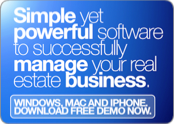Maximizing your internet connection
A continuous stream. A stream of water, electricity or consciousness, but in our case, a data stream. In it’s maximal sense, it’s anything (data) you can read, view or listen to on your computer. Now consider the components allowing this, from where you’re connected to where the thing you’re connected to is. In practical terms: where are your leads coming from? Where do you go for market data? Where is your web site?
Many people think of the internet as some broad, esoteric thing. But when you look at the simple pieces involved in getting greater use and value from this near-ubiquitous connection-system, you’ll see that it’s easy to add value to your real estate business. So instead of believing some version of “it is unknowable by me”, take a little time to understand the basics and make more informed choices. You’ll appreciate owning this knowledge because the benefits far out weigh the cost to learn it..
Many real estate business people I’ve worked with over the years have expressed their frustration at having to rely upon someone else regarding their information technology (IT) capability. Too often, IT services are delivered in a cloak of secrecy designed to increase the provider’s billable hours. The business owner really doesn’t know what’s going on and trying to remedy this can result in jumping from one provider to another - which is expensive. Also common is the “real estate agent/tech guy” (no sexism intended) who work in both endeavors and are usually good at neither. These hybrids are often turned to for expert advice, but what the questioner doesn’t know is that their counsel is, in nearly all cases, based on very narrow (only what they have personally experienced) parameters. The study of an entire system, with it’s variables and permutations considered in light of the business goals of its owner is another matter.
So let’s find a place to start.
The basic components to your internet use:
• Your physical connection
• Router - they’re all the same
• Somebody's server - theirs or yours
Your physical connection
Dial-up services still exist, but most real estate agents have the always-on variety of internet connection. Whereas there are many different types of both wired (ISDN, DSL, Cable, Fiber optic, Power-line) and wireless (Wi-Fi, Bluetooth, iBurst, DECT, WiBro/WiMAX, UMTS-TDD, HSPA, EV-DO, Satellite, LTE, Wireless USB) connections, our focus here is not on their differences.
Our focus is on the most common - and meaningful - attribute they all share: your connection provides you with an IP (internet protocol) address. This is analogous to a phone number; it is the unique identifier of a device (your computer) connected to the internet. Your computer’s address can remain the same for a long time (a static address), or change often (a dynamically allocated address), but it always has an IP address. Continuing the phone number analogy illustrates that you can connect to (or at least see) any device on the internet once you know it’s IP address.
Routers - they’re all the same
For virtually every type of connection, certainly the most common, a router is involved. Router manufacturers typically write custom software used to configure these devices and the variety may seem complex, but they’re all the same insofar as it relates to being useful to your real estate business. Routers are used to manage data traffic on your side of your internet connection. For example, a cable company comes and runs a cable from their utility box to a hole in your wall; that’s their side of the connection. Any devices you connect to that cable are your side of the connection. Devices on your side of the connection are collectively referred to as your Local Area Network (LAN).
The router is your power tool. With it, you can allow or deny certain kinds of data traffic in and out of your LAN and to which computers that data should flow to and from. Routers perform the handy little trick of sharing your one-IP-address connection with more than one computer on your LAN, but it’s their port mapping capability that yield options for you and your business.
Somebody's server - theirs or yours
Ok, so I have an IP address and a router, why do I need to know this?
Every time you connect to a web site, you’re accessing someone’s server. Most people know that. But consider that every one of those servers is a computer very much like yours. Picture your Dell box or Sony notebook or iMac or whatever as the server your connecting to when you read the news, Twitter or get email. A wall of complexity pops up for many when contemplating a “server”, as if it’s something for only geeks to know about. But in truth, the basics of every computer is the same and knowing this helps you know the options for using your internet connection more expansively. What are the biggest options? One is to add server-functionality to the (regular) computers you use now. Another is to rent a server. (More on this soon.)
Many people think of themselves only as a customer to the internet. This idea of all computing moving to the control of large providers to which monthly fees are endlessly paid was already tried in the CompuServe and Prodigy days. Trust me, you don’t want your only choice to be that of paying increasing and never-ending subscriber fees for everything you do on the internet. This vision is antithetical to humans use of large systems wherein they have a stake because people want to own their property. My prediction is that everyone will have a personal/business server - without any concerns for data portability or data interoperability. I don’t mean to say that cloud-computing and software-as-a-service won’t continue to grow, I’m saying that individuals will increasingly demand foundational systems that afford personal control and ownership while enjoying complimentary systems that extend and enhance. Others may argue that it’s the other way around - and it may be so at this time - but egalitarian instincts will dominate long-term. (One day we’ll discuss why computing is not like electricity and shouldn't be sold as such.)
Real estate has become a data-driven business and your fluency - or operational capability - of this will impact your future earnings.
A continuous stream. A stream of water, electricity or consciousness, but in our case, a data stream. In it’s maximal sense, it’s anything (data) you can read, view or listen to on your computer. Now consider the components allowing this, from where you’re connected to where the thing you’re connected to is. In practical terms: where are your leads coming from? Where do you go for market data? Where is your web site?
Many people think of the internet as some broad, esoteric thing. But when you look at the simple pieces involved in getting greater use and value from this near-ubiquitous connection-system, you’ll see that it’s easy to add value to your real estate business. So instead of believing some version of “it is unknowable by me”, take a little time to understand the basics and make more informed choices. You’ll appreciate owning this knowledge because the benefits far out weigh the cost to learn it..
Many real estate business people I’ve worked with over the years have expressed their frustration at having to rely upon someone else regarding their information technology (IT) capability. Too often, IT services are delivered in a cloak of secrecy designed to increase the provider’s billable hours. The business owner really doesn’t know what’s going on and trying to remedy this can result in jumping from one provider to another - which is expensive. Also common is the “real estate agent/tech guy” (no sexism intended) who work in both endeavors and are usually good at neither. These hybrids are often turned to for expert advice, but what the questioner doesn’t know is that their counsel is, in nearly all cases, based on very narrow (only what they have personally experienced) parameters. The study of an entire system, with it’s variables and permutations considered in light of the business goals of its owner is another matter.
So let’s find a place to start.
The basic components to your internet use:
• Your physical connection
• Router - they’re all the same
• Somebody's server - theirs or yours
Your physical connection
Dial-up services still exist, but most real estate agents have the always-on variety of internet connection. Whereas there are many different types of both wired (ISDN, DSL, Cable, Fiber optic, Power-line) and wireless (Wi-Fi, Bluetooth, iBurst, DECT, WiBro/WiMAX, UMTS-TDD, HSPA, EV-DO, Satellite, LTE, Wireless USB) connections, our focus here is not on their differences.
Our focus is on the most common - and meaningful - attribute they all share: your connection provides you with an IP (internet protocol) address. This is analogous to a phone number; it is the unique identifier of a device (your computer) connected to the internet. Your computer’s address can remain the same for a long time (a static address), or change often (a dynamically allocated address), but it always has an IP address. Continuing the phone number analogy illustrates that you can connect to (or at least see) any device on the internet once you know it’s IP address.
Routers - they’re all the same
For virtually every type of connection, certainly the most common, a router is involved. Router manufacturers typically write custom software used to configure these devices and the variety may seem complex, but they’re all the same insofar as it relates to being useful to your real estate business. Routers are used to manage data traffic on your side of your internet connection. For example, a cable company comes and runs a cable from their utility box to a hole in your wall; that’s their side of the connection. Any devices you connect to that cable are your side of the connection. Devices on your side of the connection are collectively referred to as your Local Area Network (LAN).
The router is your power tool. With it, you can allow or deny certain kinds of data traffic in and out of your LAN and to which computers that data should flow to and from. Routers perform the handy little trick of sharing your one-IP-address connection with more than one computer on your LAN, but it’s their port mapping capability that yield options for you and your business.
Somebody's server - theirs or yours
Ok, so I have an IP address and a router, why do I need to know this?
Every time you connect to a web site, you’re accessing someone’s server. Most people know that. But consider that every one of those servers is a computer very much like yours. Picture your Dell box or Sony notebook or iMac or whatever as the server your connecting to when you read the news, Twitter or get email. A wall of complexity pops up for many when contemplating a “server”, as if it’s something for only geeks to know about. But in truth, the basics of every computer is the same and knowing this helps you know the options for using your internet connection more expansively. What are the biggest options? One is to add server-functionality to the (regular) computers you use now. Another is to rent a server. (More on this soon.)
Many people think of themselves only as a customer to the internet. This idea of all computing moving to the control of large providers to which monthly fees are endlessly paid was already tried in the CompuServe and Prodigy days. Trust me, you don’t want your only choice to be that of paying increasing and never-ending subscriber fees for everything you do on the internet. This vision is antithetical to humans use of large systems wherein they have a stake because people want to own their property. My prediction is that everyone will have a personal/business server - without any concerns for data portability or data interoperability. I don’t mean to say that cloud-computing and software-as-a-service won’t continue to grow, I’m saying that individuals will increasingly demand foundational systems that afford personal control and ownership while enjoying complimentary systems that extend and enhance. Others may argue that it’s the other way around - and it may be so at this time - but egalitarian instincts will dominate long-term. (One day we’ll discuss why computing is not like electricity and shouldn't be sold as such.)
Real estate has become a data-driven business and your fluency - or operational capability - of this will impact your future earnings.




